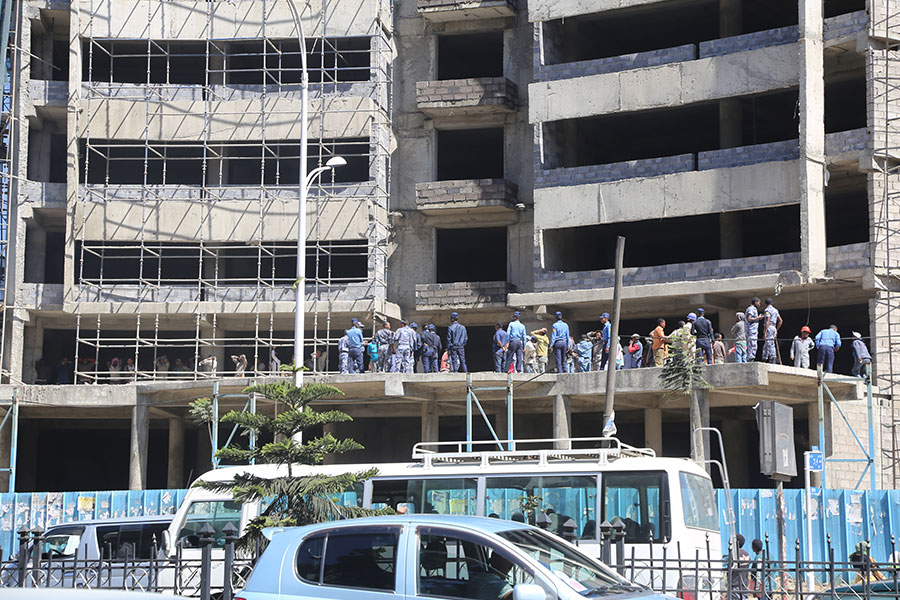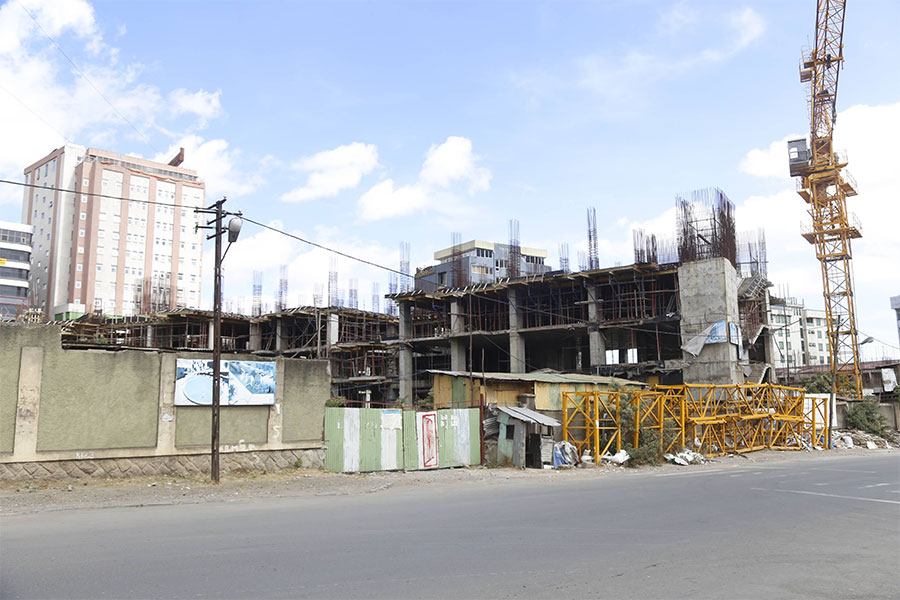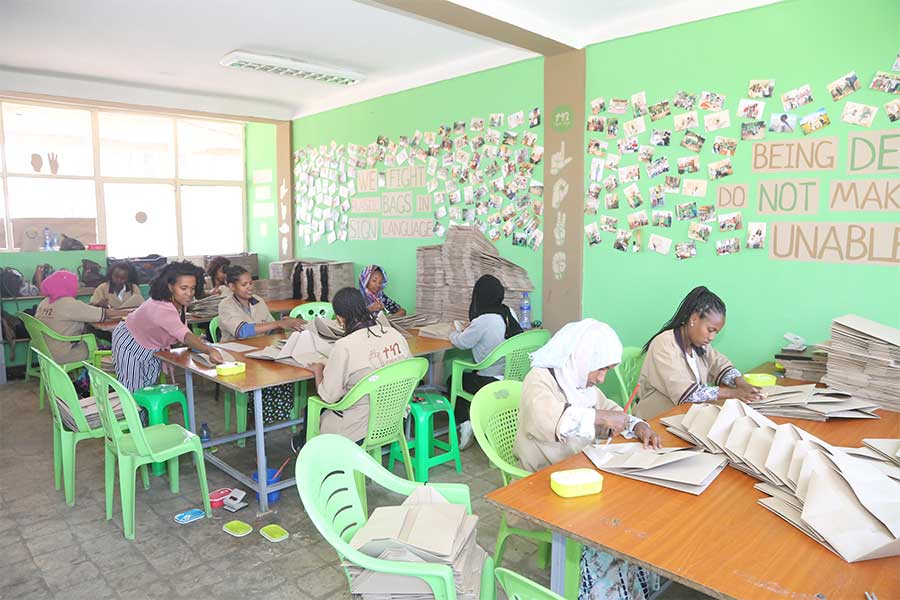
Fortune News | May 04,2024
On the afternoon of June 12, 2019, Leulseged Belachew, 43, was lounging with his friends around CMC square. Leulseged and his friends are waiting for someone to rent construction equipment, so that they can be hired as operators.
Leulseged has worked as an equipment operator for 13 years in the construction business, travelling as far south as Bale and as far north as Gojjam.
“Since I started working in construction sometime in 2006, I have never experienced such a slowdown as this,” Leulseged said.
The slowdown has forced him to pull his children out of private schools and enroll them in public schools.
Three years ago he earned 10,000 Br a month including allowances, but now he is taking home about 4,000 Br, and there are no allowances to supplement his income.
Leulseged says that the sector has stagnated, and he and his friend spend most of their time looking for work. When they are offered jobs in the rural areas of the country, they are faced with security problems.
Around CMC, within the island areas between the road lanes, there are close to 50 pieces of heavy construction equipment parked, with some of them sprouting weeds and covered in grime.
Leulseged’s friend, Sentayehu Belay, is in his late 20s and started working in construction as an operator nearly six years ago. He agrees with his friend that the business began to slow down about three years ago when the income they earned was excellent. That was a time when the construction industry was booming and a stampede to enter the business ensued to import machinery to rent out.
Recent data shows that the country has 7,000 registered contractors and 16,424 pieces of heavy construction equipment, a spike from 9,856 pieces of construction machinery registered just five years ago.
However, data from the National Bank of Ethiopia shows that the growth of the construction industry has significantly declined over the past two years.
Excavators and a bulldozer are parked by the road side in Summit, Bole District.
During the 2014/15 fiscal year, the annual rate of growth of the construction sector was 31.6pc, which declined to 20.7pc in the 2016/17 period and further decreased to 15.7pc in the last fiscal year.
“Now, we can’t get what we used to earn,” Sentayehu said. “When we ask our employers if there is any work, they tell us ‘no’, and even they have a hard time paying us on time for what little work we do,” he adds.
Being an operator as his only profession, Sentayehu ponders what will happen to him if the slowdown continues like this.
The effect is seen not only on individuals and small rental companies but also on larger companies that engage in the rental and retail side of the business.
Caterpillar Machinery Rental Plc, which rents construction equipment like excavators, graders and loaders from an office in Aqaqi Qality near Weha Limat, is one of them.
The manager of the company, Wesson Alemayehu, who joined the business nine years with five pieces of machinery, attests that the construction sector has contracted and stagnated.
Wesson attributes the current shortage of foreign currency as the primary cause for the slowdown of construction activities across the country.
Two months ago, Yinager Dessie (PhD), governor of the National Bank of Ethiopia, expressed his frustration on the current depletion of the foreign currency reserves in the country. He told parliament that the nation’s foreign exchange reserves would only cover two months of imports.
“If this shortage continues, it will only enable the country to import pharmaceutical products and fuel,” he said.
In the black market, traders buy a dollar for 41 Br, which represents a 43pc premium to what the government sells dollars at - 28.6 Br.
Four years ago Wesson used to rent loaders for 1,000 Br an hour, but now the rental fee has plummeted to 700 Br an hour. Three years ago, he used to operate with 30 employees, but now he only has three, forced to lay off most of his labour force due to the slowdown.
Since most of the machinery stands idle and there is a shortage of storage areas, he is forced to pay 200 Br a month for each machine he parks in Aqaqi Qality.
Abebe Kasahun, in his mid-20s, started working as a security guard earning 1,000 Br a month by looking after an array of construction machinery that is parked in the area. He supplements his income by cleaning some of the parked equipment, he says. In the five months or so since Abebe has been working as a guard, he has witnessed the number of machinery parked in the area significantly increase.
Even to maintain the machinery he owns, Wesson claims that he is facing challenges procuring spare parts that keep the equipment idle for a long time.
“We are also facing shortages of spare parts for our equipment since most of them have to be imported,” he said. “It takes up to five months to import spare parts from abroad and to repair a piece of machinery.”
Wesson also laments the cost of transporting his heavy equipment to remote areas of the country, which can run up to 40,000 Br a piece.
The business slowdown has also forced some firms in the machinery rental business to segue into other activities.
Zelalem Wegderes, manager of Conad Construction & Related Advertising Service, who joined the construction business in 2009, is one of them. Because of the slowdown in the construction sector, he shifted to construction supply where he sells gypsum and partitions.
He claims that three years ago, he used to receive nearly 20 calls a day to rent his machinery, but now he answers two calls on his busiest days. He also attests that the rental fees have dropped precipitously. Zelalem used to charge 2,200 Br an hour for an excavator three years ago; he now charges 1,200 Br.
Negash Lemma, 28, who had travelled from West Shoa, Hager Mariam, looking for an excavator to rent for a project to construct a pond that he thinks will take 10 days to complete, also observes the rental fee drop.
“I am surprised that the rental fees are so low. They are far below my expectation,” Negash told Fortune.
The slowdown in demand and declines in rental fees is a simmering problem for companies and individuals who make their livelihoods in the business.
“Eighty percent of our income has disappeared in the last few years,” said Zelalem. “I used to employ 20 workers, but I have reduced my workforce to just three.”
Aside from the shortage of foreign currency that has hamstrung the industry, the general political uncertainty in the country is also a factor in the slowdown, according to Zelalem.
Tesfaye Melaku, a lecturer at Bahir Dar University’s economics department, believes that the economy highly depends on the construction industry.
“Though the construction industry will help the country to boost its economy, too much dependency is not recommended,” Tesfaye said.
The construction industry’s 16pc contribution to GDP is not healthy for the economy, and he advises that the government should take action.
“Also, to meet the local demand, the country recently imported re-bar valued at 1.3 billion dollars by investing some of its scarce foreign currency, which directly affects the country’s economy,” Tesfaye said.
The government should focus on sectors that generate foreign currency in a short period like mining. Also, it should open up the financial and banking business to non-nationals, Tesfaye recommends.
However, Leulseged, the construction machinery operator, remains pessimistic about an industry that he is engaged in. He is now thinking of changing his field, becoming a truck driver.
“I’m thinking of getting a driving license for trucks to feed my family,” he told Fortune.
PUBLISHED ON
Jun 15,2019 [ VOL
20 , NO
998]

Fortune News | May 04,2024

Radar | Dec 25,2018

Commentaries | Sep 24,2022

Radar | Sep 10,2021

Fortune News | Jan 22,2022

Life Matters | Apr 02,2022

Commentaries | Nov 13,2021

Viewpoints | Jun 12,2021

Featured | Nov 02,2019

Radar | Apr 15,2023

Dec 22 , 2024 . By TIZITA SHEWAFERAW
Charged with transforming colossal state-owned enterprises into modern and competitiv...

Aug 18 , 2024 . By AKSAH ITALO
Although predictable Yonas Zerihun's job in the ride-hailing service is not immune to...

Jul 28 , 2024 . By TIZITA SHEWAFERAW
Unhabitual, perhaps too many, Samuel Gebreyohannes, 38, used to occasionally enjoy a couple of beers at breakfast. However, he recently swit...

Jul 13 , 2024 . By AKSAH ITALO
Investors who rely on tractors, trucks, and field vehicles for commuting, transporting commodities, and f...

Sep 13 , 2025
At its launch in Nairobi two years ago, the Africa Climate Summit was billed as the f...

Sep 6 , 2025
The dawn of a new year is more than a simple turning of the calendar. It is a moment...

Aug 30 , 2025
For Germans, Otto von Bismarck is first remembered as the architect of a unified nati...

Aug 23 , 2025
Banks have a new obsession. After decades chasing deposits and, more recently, digita...